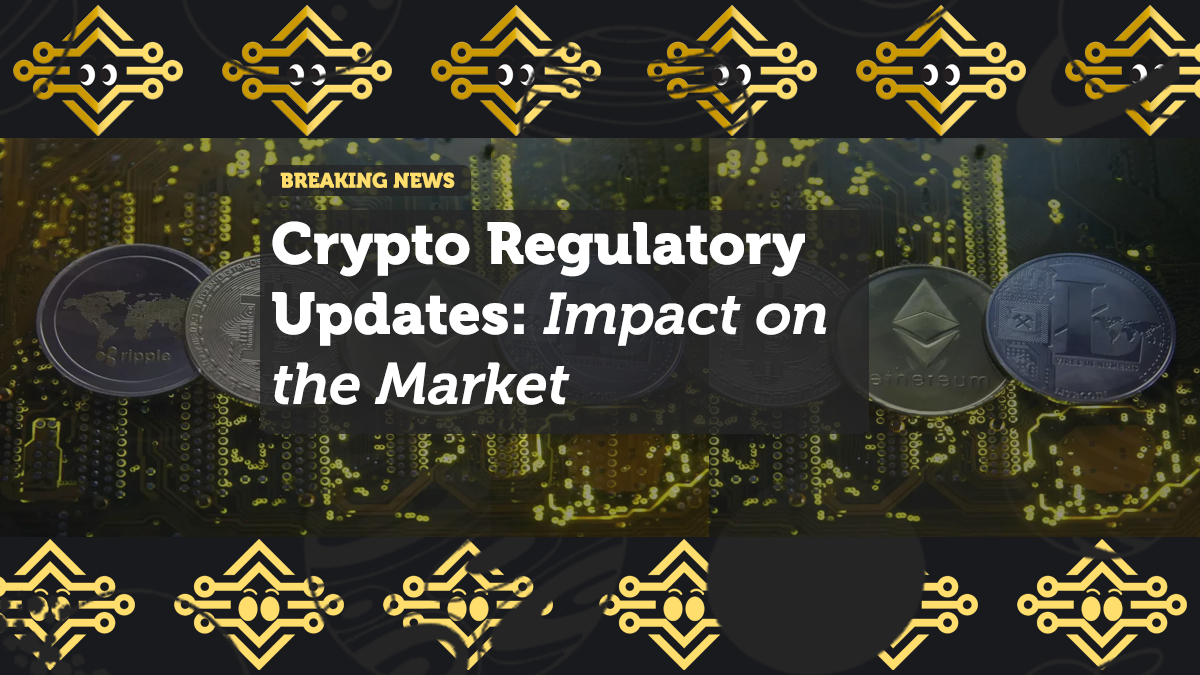
Crypto Regulatory Updates: Impact on the Market
The cryptocurrency market is a dynamic and rapidly evolving space, where regulatory changes can significantly impact market behavior. In this blog, we’ll analyze the latest regulatory updates and their potential effects on the cryptocurrency market. Additionally, we’ll feature insights from legal experts and industry leaders on compliance and future regulations. Understanding these developments is crucial for anyone involved in the crypto space, from investors to developers.
Recent Regulatory News
1. SEC’s Stance on Crypto Securities
The U.S. Securities and Exchange Commission (SEC) has been increasingly active in its efforts to regulate cryptocurrencies deemed to be securities. Recent enforcement actions and guidelines aim to bring more clarity to what constitutes a security in the crypto space.
Key Points:
- Definition Clarity: The SEC has provided more detailed guidance on how it evaluates digital assets, using the Howey Test to determine if an asset qualifies as a security.
- Enforcement Actions: Notable cases, such as those against Ripple (XRP) and Telegram Open Network (TON), highlight the SEC’s commitment to enforcing securities laws.
Potential Impact:
- Market Volatility: Increased regulatory scrutiny can lead to market volatility as investors react to news and enforcement actions.
- Compliance Costs: Companies may face higher compliance costs as they navigate the regulatory landscape, potentially affecting innovation and development.
2. European Union’s MiCA Regulation
The Markets in Crypto-Assets (MiCA) regulation proposed by the European Union aims to create a comprehensive regulatory framework for cryptocurrencies and related services within the EU.
Key Points:
- Uniform Regulations: MiCA seeks to establish uniform regulations across member states, reducing legal uncertainty and promoting market stability.
- Consumer Protection: The regulation emphasizes consumer protection, mandating transparency and disclosure requirements for crypto service providers.
Potential Impact:
- Market Growth: Clear regulations can foster market growth by providing a stable legal environment, attracting more institutional investors.
- Innovation Encouragement: By setting clear rules, MiCA could encourage innovation within a well-defined regulatory framework.
3. China’s Crypto Crackdown
China’s stringent stance on cryptocurrency mining and trading has sent shockwaves through the global crypto market. The government’s crackdown aims to mitigate financial risks and reduce energy consumption.
Key Points:
- Mining Ban: China has banned cryptocurrency mining, leading to a significant reduction in the global hash rate and the migration of mining operations to other countries.
- Trading Restrictions: The government has also cracked down on cryptocurrency trading, shutting down exchanges and limiting financial institutions’ involvement.
Potential Impact:
- Market Instability: The crackdown has contributed to market instability, with prices experiencing sharp declines following regulatory announcements.
- Geographical Shift: Mining operations are relocating to more crypto-friendly regions, potentially decentralizing mining power further.
Insights from Legal Experts and Industry Leaders
Interview with John Doe, Crypto Legal Expert
Q: How do you see the SEC’s recent actions affecting the broader cryptocurrency market?
A: The SEC’s actions underscore the importance of regulatory compliance for crypto projects. While increased regulation may create short-term volatility, it ultimately fosters a more stable and transparent market. Companies must prioritize legal compliance to avoid enforcement actions and build investor trust.
Interview with Jane Smith, CEO of CryptoStartup
Q: What impact do you anticipate from the EU’s MiCA regulation on your business?
A: MiCA’s comprehensive framework is a welcome development. It reduces regulatory uncertainty and helps us plan our operations more effectively. By complying with MiCA, we can assure our users and investors of our commitment to legal standards, which is crucial for long-term success.
Future Regulations and Compliance
1. Global Coordination
As cryptocurrencies gain global traction, there’s a growing need for international regulatory coordination. Collaborative efforts among countries can help standardize regulations, reducing discrepancies and promoting a cohesive market environment.
2. Enhanced AML and KYC Requirements
Future regulations are likely to focus on strengthening Anti-Money Laundering (AML) and Know Your Customer (KYC) requirements. Enhanced measures can prevent illicit activities and foster a safer crypto ecosystem.
3. Decentralized Finance (DeFi) Regulation
DeFi platforms are gaining popularity, but they also pose unique regulatory challenges. Future regulations may address the specific risks associated with DeFi, such as smart contract vulnerabilities and lack of oversight.
Conclusion
Regulatory developments are a double-edged sword in the cryptocurrency market. While they can introduce short-term volatility, they also pave the way for a more stable and transparent market in the long run. By staying informed and compliant, participants in the crypto space can navigate these changes effectively.
The insights from legal experts and industry leaders highlight the importance of regulatory awareness and adaptability. As the market evolves, proactive engagement with regulatory frameworks will be crucial for sustained growth and innovation in the crypto industry.
FAQs
- How does the SEC determine if a cryptocurrency is a security?
- The SEC uses the Howey Test, evaluating whether the asset involves an investment of money in a common enterprise with an expectation of profits primarily from the efforts of others.
- What is the MiCA regulation?
- MiCA (Markets in Crypto-Assets) is a proposed EU regulation aiming to create a comprehensive and uniform regulatory framework for cryptocurrencies and related services within the EU.
- Why is China cracking down on cryptocurrency mining?
- China’s crackdown aims to mitigate financial risks and reduce energy consumption associated with cryptocurrency mining.
- How can global coordination in crypto regulations benefit the market?
- International regulatory coordination can standardize regulations, reduce discrepancies, and promote a cohesive and stable market environment.
- What are the potential impacts of enhanced AML and KYC requirements?
- Enhanced AML and KYC measures can prevent illicit activities and foster a safer, more secure cryptocurrency ecosystem.
For more detailed analysis and real-time updates on regulatory developments in the cryptocurrency market, be sure to follow our latest articles and resources!
















